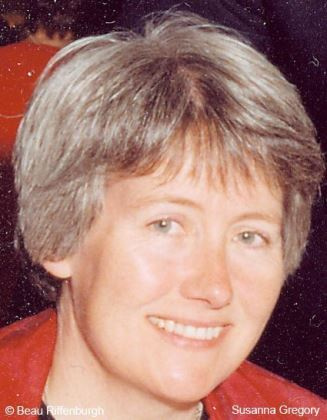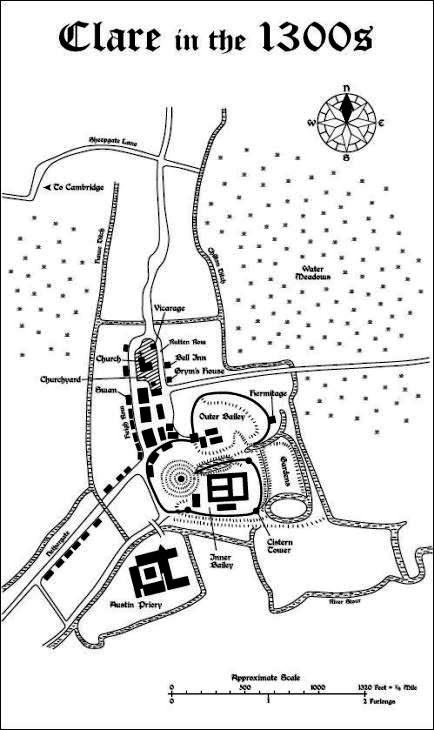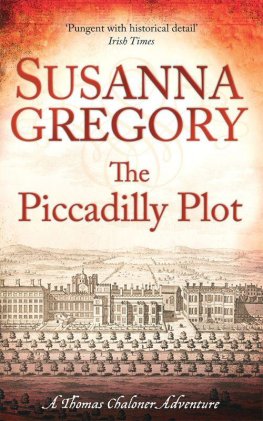Susanna Gregory
THE HABIT OF MURDER
2017

Susanna Gregory was a police officer in Leeds before taking up an academic career. She has served as an environmental consultant, worked seventeen field seasons in the polar regions, and has taught comparative anatomy and biological anthropology.
She is the creator of the Matthew Bartholomew series of mysteries set in medieval Cambridge and the Thomas Chaloner adventures in Restoration London, and now lives in Wales with her husband, who is also a writer.

Cambridge, 28 March 1346
It was the worst day of Richard de Badews life. Two decades before, he had founded a new College, which he had proudly named University Hall. It had started out as two cottages, but he had worked tirelessly on its behalf, and it now owned several large houses and a sizeable tract of land. Its membership had grown, too, from three Fellows to eighteen, and Badew ensured they were always paid on time even when it meant hardship for himself. University Hall had flourished under his watchful eye. Or so he had thought. Unfortunately, its Fellows disagreed.
He looked at them as they stood like peacocks in their ceremonial finery. All were young, greedy and ambitious, and thought they deserved the best of everything a larger salary, a bigger library, newer rooms and smarter robes. Badew had done his best to oblige, but he was not a very rich man, and he had been forced to refuse some of their more outlandish demands. So what had they done? Gone behind his back to the wealthy Elizabeth de Burgh, known as the Lady of Clare, and asked her to take over the role of major benefactor instead.
It was an act of treachery that had wounded Badew to the core.
His first instinct had been to wash his hands of the lot of them and have no more to do with the place ever again, but then he had reconsidered. Why should he make things easy for the damned ingrates? So, in an act of defiant retaliation, he had deployed the only weapon he had left to him: refusing to sign the quit-claim the deed whereby all rights and claims to the property would pass from him to the Lady. He had become quite an expert at devising reasons as to why he could not do it the scribes writing was illegible, the wording was wrong, an important clause had been omitted, he had lost his seal.
He had managed to stall and dissemble for ten long, gratifying years, but even he had run out of excuses eventually, and the exasperated Fellows of University Hall, sensing victory at last, had arranged for him to put his name to the quit-claim that very day.
Because he had caused them so much aggravation, they had spitefully invited a crowd to witness his final defeat. They included not only the Lady and several members of her household, but a host of scholars and townsfolk as well. Glancing around, Badew saw there were only two he could count as friends among the entire throng Saer de Roos and Henry Harweden, who stood behind him, each with a hand on his shoulder as a gesture of solidarity.
The ceremony was taking place in University Halls lecture room, a handsome chamber with tapestries on the walls and a huge fire snapping in the hearth. It was uncomfortably hot, and Badew was not the only one who mopped sweat from his brow as young Master Donwich made a gushing, sycophantic speech about the Ladys largesse. His mind wandered back to the day when he had founded the place a whole new College born with a single stroke of his pen. He had been the Universitys Chancellor at the time, a man at the height of his powers.
And then Donwich stopped talking and everyone looked expectantly at Badew: it was time to sign. Truculent to the last, Badew picked up the document and began to study it, aware of Donwich exchanging anxious glances with his cronies. Good! Once they had his signature, they would be rid of him for ever, so it was his last chance to be irksome.
As he pretended to read, he was pleased to note that it was not only the Fellows who were becoming riled by his antics so was the Lady of Clare, who considered herself far too important to be kept waiting by the likes of him. Widowed three times before she was thirty, she had inherited a vast fortune, which had given her an inflated sense of her own worth. Well, it would do her good to learn that money could not buy everything, because he would not be rushed.
Another person made uneasy by the delay was the Ladys steward, Robert Marishal. Rashly, Marishal had brought his children to Cambridge with him twins, nine years old. Thomas and Ella looked like angels with their golden locks and blue eyes, but within an hour of their arrival, they had broken three valuable plates, torn a book, and let a pig into the parish church. And now some new delinquency was in the making, because they were nowhere to be seen. Their apprehensive father was desperate for the signing to be over, so that he could find the brats before there was yet more trouble.
You have had an entire decade to ponder this quit-claim, Master Badew, barked the Lady eventually. Do you really need to go through it again?
I am a lawyer, My Lady, Badew replied with haughty dignity. And the law and haste make for poor bedfellows. None of us want to be subjected to this disagreeable rigmarole a second time, just because some facet of the transfer is badly worded.
We both know that is unlikely, given the number of times it has been redrafted, the Lady retorted drily. Or would you rather I took my patronage to another foundation?
There is no need for that, blurted Donwich in alarm before Badew could tell her to do it. We are all delighted by your offer to save us from financial ruin.
Financial ruin? echoed Badew indignantly. I have been more than generous, and
It takes sixty pounds a year to run a College properly, interrupted Donwich acidly. Not the twenty you provide. So unless you can give us what we need, it is time for you to step aside and let someone else help us.
Sixty pounds? cried Badew, shocked. That is outrageous! Greedy, even! But regardless, I refuse to be bullied, so either shut up while I read this thing, or I shall go home.
Everyone immediately fell silent, knowing he meant it. Only when the audience was completely still did Badew bend to the quit-claim again, carefully weighing the implications of each word until he reached the end. And then there was no more he could do the last battle was over and the war was lost. With a sense of bitter regret, he picked up his pen, acutely aware of the tension that filled the room. He gave the nib a good dunk in the inkpot and started to write then flung the pen away with an exclamation of disgust. It was not ink in the pot, but thick red blood.
You put that in there yourself, Badew, snarled Donwich accusingly. You cannot bear to admit defeat, so you resort to low tricks instead. You will do anything to postpone
How dare you! bellowed Badew, affronted. What do you take me for?
I shall offer my purse to Michaelhouse if this business is not resolved today, warned the Lady before Donwich could tell him. I have had enough of Badews juvenile capers.
Juvenile capers, mused Roos, and pointed to a bulge in a tapestry; the cloth trembled as the two small culprits laughed helplessly behind it. I think an apology is in order, Donwich.
I saw the twins at the slaughterhouses this morning, put in Harweden with a moue of disgust. I wondered what they were doing there, and now we know. They have been planning this nastiness for hours.




